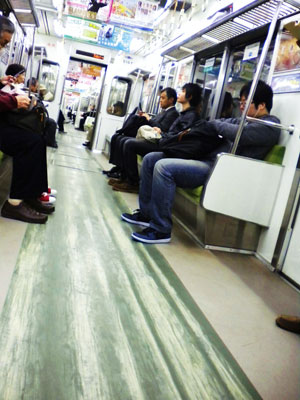All Nonfiction
- Bullying
- Books
- Academic
- Author Interviews
- Celebrity interviews
- College Articles
- College Essays
- Educator of the Year
- Heroes
- Interviews
- Memoir
- Personal Experience
- Sports
- Travel & Culture
All Opinions
- Bullying
- Current Events / Politics
- Discrimination
- Drugs / Alcohol / Smoking
- Entertainment / Celebrities
- Environment
- Love / Relationships
- Movies / Music / TV
- Pop Culture / Trends
- School / College
- Social Issues / Civics
- Spirituality / Religion
- Sports / Hobbies
All Hot Topics
- Bullying
- Community Service
- Environment
- Health
- Letters to the Editor
- Pride & Prejudice
- What Matters
- Back
Summer Guide
- Program Links
- Program Reviews
- Back
College Guide
- College Links
- College Reviews
- College Essays
- College Articles
- Back
Saving Money on the Way Downtown
Traffic steals our money; traffic steals our time; traffic steals money that would be spent on other things that are wanted more. Is there another way? The South Hills has a way. Drive to a subway and a subway will drive you. More specifically, Pittsburgh’s T-Train. Subways like the T-Train exist in many cities and townships, but not the North Hills. If the T subway existed in the North Hills, everyone who uses it would save money.
Riding a subway instead of driving a car would save subway riders money. First, people who use the subway would save money because there will no longer be the need to put resources into a car. A motorist would no longer need to repair or fuel a car. This act alone would save a motorist $10,000 and his temper in frustrating repairs and fill ups every year (Benefits). When people use their cars less, they do not need to fuel them as much and there is less of an opportunity for them to break. Also, money would be saved along with time. Instead of watching time drift by sitting in traffic, riders can take more time to work or to not travel at all. This increased productivity would come from saving the average seven hours in traffic that some commuters face in cities like Toronto (Preville). Arriving at work quickly creates many opportunities to raise productivity and income. Finally, riders would save money in the form of taxes. While the T train in Pittsburgh does not require a fair, money from taxes goes towards the train. This system is better because the regular fare paid “would act like a regressive tax, hurting people proportionately to the money they can afford to pay for the train (Farmer).” If the fair is removed and the train comes from the already existing budget, which many cities have done, we can avoid a subway fare and still gain a beneficial subway in the North Hills. Other areas are saving time and money thanks to a free subway. Shouldn’t the North Hills have this as well?
Increases in public transportation might seem like an obvious choice to benefit the public, but some will deny that it would cause any difference at all. Many opponents of public transportation will say that it will not be used when the price of gasoline “inevitably” falls. However, the price of gasoline may never fall. Gasoline is a limited natural resource; consequently, the supply of it is always falling. Basic supply and demand logic says that the price will continue to climb. Only a few places in the world pump oil out of the ground for gas, and some of those places are victim to interruptions in production. For example, the Natural Resources Defense Council (NRDC) says that continuing unrest in the Middle East, like the Yemeni Civil War, will cause prices to rise and the amount of gasoline available to fall (McShane). Furthermore, the White House recommends, in order to curb fuel dependency and vulnerability, that there should be major improvements to public transportation systems (McShane). Logic, economics, and the United States government all agree that the price of gasoline will not kill public transportation, and they even seem to encourage it.
As a result of riding the T-Train in the North Hills, people will save money. Riding the subway will allow riders to cut money used for cars, shear time wasted in traffic, and slash the pain of taxes by taking advantage of something that is free and is paid for by current tax revenue. After all, everyone wants to save money, and Pittsburgh’s T-Train will allow riders in the North Hills to do just that. Public transportation: saving money transporting the public.

Similar Articles
JOIN THE DISCUSSION
This article has 0 comments.

I was born in the South Hills of Pittsburgh before moving a just a few minutes north to North Allegheny. Whenever I make a trip back to the South Hills or to Pittsburgh, I ride the T Subway mentioned in my article. I always enjoy it, but it isn't in the North Hills. I wrote this about a change in my environment that I would like to see.